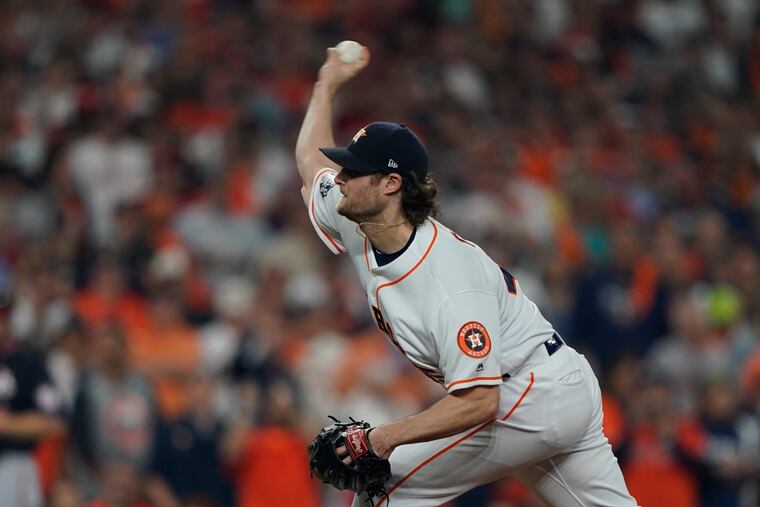Phillies say it’s time to win, but first they need pitching
The Phillies may believe that it is time to win, but it’s hard to imagine that happening with their current starting pitchers. That, according to a source, is what sent Klentak into the offseason with a plan that is centered around improving the rotation.

SCOTTSDALE, Ariz. -- The Phillies lost 99 games in 2015, tasting defeat that season more than any team in baseball before Matt Klentak was hired in October. The new general manager had an arduous plan to return pride to the franchise that four years earlier won its fifth straight division title.
But first, he needed patience. A World Series champion would not be built in a day.
In his early seasons, Klentak shied away from providing a timeline of when the Phillies might contend, saying repeatedly that the players would dictate the rebuild. There were no rallying cries or bold proclamations, only that the Phillies “will win as soon as we possibly can.”
Four years and three managers later, Klentak’s tone has changed. The Phillies, Klentak said last month after hiring Joe Girardi, have “reached a place where it’s time to win.” At last, the Phillies had a clear idea of when they expected to contend.
“That’s what I believe,” Klentak said Tuesday at the general managers’ meetings at the Omni Resort and Spa. “Our roster is constructed in such a way that we have a core of talent on the club right now that is in the prime of their career. We have a dedicated ownership and organization that’s ready for it, we have a fan base that wants it. It’s time.”
The Phillies might believe that it is time to win, but it’s hard to imagine that happening with their current starting pitchers. That, according to a source, is what sent Klentak into the offseason with a plan that is centered on improving the rotation. The Phillies will likely add at least two starters to a rotation that has spots reserved for Aaron Nola and Jake Arrieta, and Nick Pivetta, Vince Velasquez, or Zach Eflin could claim a third while Spencer Howard climbs toward the majors.
And that is when things could get uncomfortable for Klentak, who is weary about signing pitchers to long-term deals but understands that adding a premier starting pitcher this winter provides the team’s best route to the contention he feels is near. The Phillies, a source said this week, will be in the mix this winter to add Gerrit Cole or Stephen Strasburg, both of whom could net a six-year deal. The Phillies have the financial resources to win one of them while also adding a lower-tiered pitcher like Cole Hamels or Wade Miley on a shorter-termed deal to fill out the rotation.
“Pitching is fragile and if you’re relying on free-agent starting pitching to build your organization, you go into that knowing you may be left disappointed at some point in that contract,” Klentak said. “Even the Phillies during their great run from ’07-11, some of the more notable pitchers that they brought in were really good at the front end of those contracts and not healthy at the back end of those contracts. Even in a successful case like Roy Halladay or Cliff Lee, those didn’t end particularly well."
“You just have to know the pitfalls, know what you’re getting into. I don’t like to operate in absolutes to say that we would or would never do something. I never thought we’d sign a position player to a 13-year contract, but we did it [Bryce Harper]. You want to be open-minded and operate without absolutes, but at the same time you want to go in understanding your realities and some of the risks.”
The cost of adding an impact starting pitcher is not limited to years and dollars, but also draft picks. The Phillies would forfeit their second-round pick and cut their international spending allotment by $500,000 if they sign a player who was extended a qualifying offer from his former team. Madison Bumgarner, Cole, Jake Odorizzi, Strasburg, and Zack Wheeler all come at that price, but that does not sound to be enough to alter the team’s thinking.
“You just have to operate on a case-by-case basis,” Klentak said. “Draft picks have a certain value, and sometimes you might be willing to forfeit that value and sometimes you may not, and you kind of bake that into your process a little bit. … We’ve given up three picks in the last two years, which at some point if you keep doing that year over year, it’s going to come back to bite you.”
The Phillies, four years after finishing with baseball’s worst record, invested a half-billion dollars into their roster before last season, yet still missed the playoffs for an eighth straight year.
Their bullpen, which the Phillies bulked up last winter while neglecting their starting rotation, was ravaged by injuries but still performed well enough in the second half. Instead, it was the rotation -- which had the eighth-lowest WAR in baseball and had just one pitcher with an ERA better than 4.22 -- that topped the list of reasons why the Phillies missed the playoffs.
But four weeks after the season ended, Klentak said it was time to win. It’s safe to assume that he made that proclamation -- his boldest since being hired -- knowing his rotation would be quite different. And now he’s on a mission to address it.